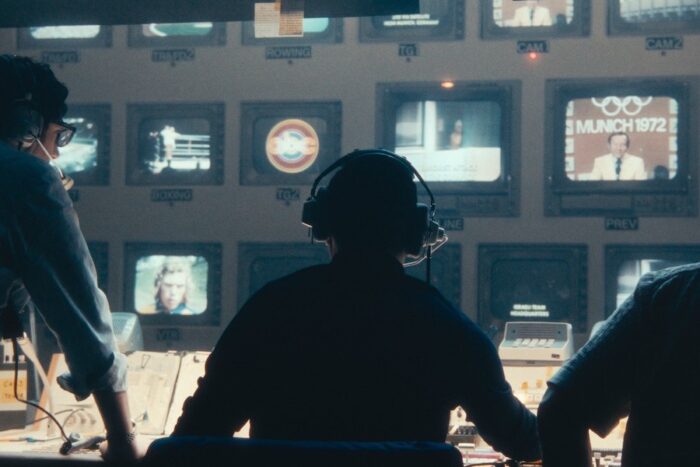September 5: A tense, absorbing thriller
Review Overview
Cast
8Direction
8Tension
8David Farnor | On 22, Aug 2025
Director: Tim Fehlbaum
Cast: John Magaro, Peter Sarsgaard, Ben Chaplin, Zinedine Soualem, Leonie Benesch
Certificate: 15
“If they kill a hostage on live television, whose story is it? Is it ours or is it theirs?” That’s the impossible dilemma facing the ABC TV crew on 5 September 1972, when terrorists attack the Munich Olympics. Broadcasting live when the attack takes place, the small team find themselves relaying the events around the world – despite the fact that they do sports not news.
That fact alone makes them ill-equipped to handle the complicated politics behind, before and after the attack – which saw the Palestinian militant group Black September take 11 Israeli hostages at the sporting tournament. Unlike Steven Spielberg’s 2005 drama Munich, which explicitly dives into the moral complexity of the aftermath – charting the Mossad operation in retaliation to the attack – September 5 intentionally steps away from the bigger picture and keeps things clinically trained on the events at hand.
The film unfolds almost entirely in one room: the cramped studio just outside of the Olympic village, where Geoffrey Mason (John Magaro) is attempting to direct the broadcast – overseen by producers Roone Arledge (Peter Sarsgaard) and Marvin Bader (Ben Chaplin). When they first hear the gunshots from the village, they’re not quite sure what they’re hearing – and only as the nightmarish situation unfolds do they begin to grasp the significance of the events, and the responsibility they now carry.
There’s a shrewdly observe mix of adrenaline and fear, as the team initially fight for satellite feeds and the right to continue presenting the coverage themselves – there is a sense of elation as they try to outwit other rival broadcasters from delivering the scoop to the viewing public. But at the same time, they find themselves in unfamiliar waters of trying to fact-check rumours and hearsay, avoiding the legal and ethical dangers of broadcasting incorrect statements about a highly sensitive matter. What begins with a hushed excitement descends into a quiet, nail-biting tension.
John Magaro is excellent as the headstrong but nervous Mason, supported by the always-excellent Ben Chaplin and the ever-reliable Peter Sarsgaard, who distill the pressure facing them all with a subtle, understated intensity. Completing the ensemble are veteran engineer Jacques Lesgards (Zinedine Soualem) and young translator Marianne Gebhardt (a scene-stealing Leonie Benesch), the latter the only person able to speak German and Hebrew. They, and Bader, gently delve into questions of history and identity, the weight of the past and the burden of the future.
But the script – co-written by Fehlbaum, Moritz Binder and Alex David – is laser-focused in its restraint and remit. Fehlbaum’s direction is a masterclass in efficiency and clarity, cleverly using archive footage of the actual broadcast for our behind-the-scenes characters to interact with. The result is somewhere between The Newsroom and Good Night, and Good Luck, cleverly leaving us to bring our own modern awareness and context to what we’re watching. It’s a thought-provoking, tense and absorbing thriller, and a reminder of the duty incumbent on every media report we encounter about international conflicts.


















